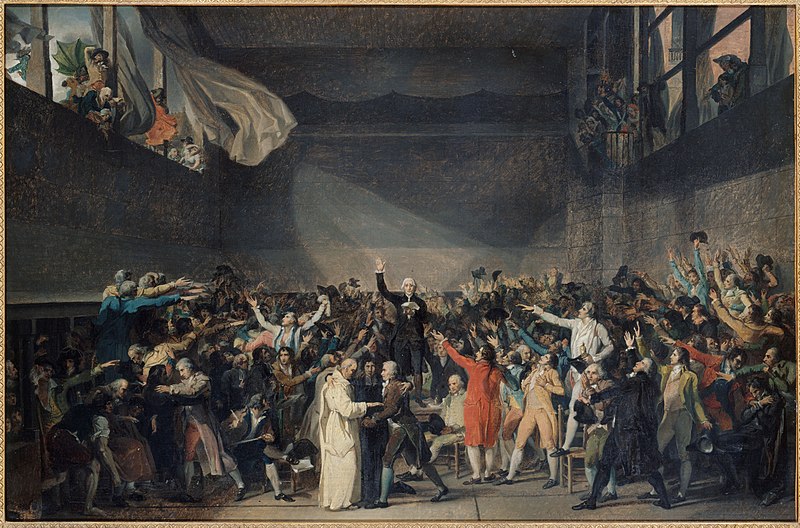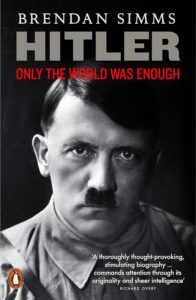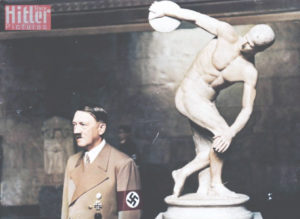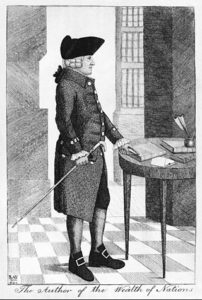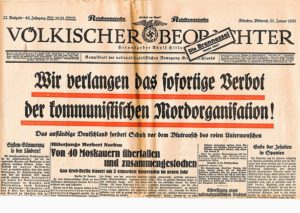Hitler rejected the ‘purely economic way of looking at things’, which he called the ‘greatest mistake of German policy in the past decades’. ‘The hoped-for peaceful seizure of [world] power through our economy,’ he continued, ‘has been a failure.’ ‘Industrialization [and] the peaceful capture of the world,’ Hitler claimed, were doomed to fail, because one ‘did not consider that there can be no economic policy without the sword [and] no industrialization without power’. ‘The economy,’ he explained, ‘is only of secondary importance.’ ‘The main thing,’ Hitler stressed, ‘is national pride, [and] love of country.’ The primacy of politics in Hitler’s thinking could not have been more clearly expressed.
Calvin Coolidge was born in Massachusetts, a state founded by English Puritans. Compare the above quote with that famous phrase by Coolidge, the 30th president of the US: ‘The business of America is business’ in the sense that his was the nation of pure materialism. I remember, when I lived in California in the 1980s, the words of President Ronald Reagan, who wanted a globalised world where ‘the market reigned supreme’.
The key question, Hitler stated, was not the state form itself, but what arrangement served the German people best in its quest to escape external subjection. Here there was remarkably little shift in his views throughout the early 1920s. The issue was not, he argued in April 1920, whether Germany should be ‘a monarchy or a Republic’, but rather ‘which state form was best for the people’. ‘We need a dictator of pure genius if we want to rise again.’ ‘We do not fetishize forms of government,’ he explained in November 1921, ‘the only thing that is decisive is the spirit which sustains it. The only consideration must be the welfare of the entire German people.
Compare this with the forums of American white nationalism, which endorse democracy and in recent years have suggested that their visitors vote for this or that candidate. And the racialists on the other side of the Atlantic are no better. At the only BNP rally I have attended I spoke to a couple of senior members, who informed me that their aims were strictly democratic, not fascist.
He called for the nationalization of the entire banking and financial system, and thus the ‘breaking of interest slavery’, a term he had borrowed from Gottfried Feder. His aim here was not so much public ownership in the Marxist sense, as national control over the levers of international financial manipulation. Hitler had not yet called for the physical destruction of world Jewry, but the elimination of German Jewry was already implicit, at least in the context of a future war, in case they might once again act as fifth columnists. In the Gemlich letter of September 1919, he had already called for the ‘complete removal of the Jews’, and in a letter of August 1920, one correspondent reports that Hitler believed that ‘the bacillus’ must be ‘exterminated’ in order to ensure the survival of the German people. One way or the other, his domestic policy was essentially foreign policy.
Compare this with the first American president, who stated that it would be bigoted, in the new nation, to discriminate against Jewry. So who caused their empowerment in today’s world?
Unlike the Judeo-reductionism in vogue in white nationalism and even the Gemlich letter of September 1919, the conceptual framework for understanding the West’s dark hour can already be gleaned from texts by Alexis de Tocqueville and John Stuart Mill.
In On Liberty Mill concludes that in former times, when it was proposed to burn atheists, charitable people used to suggest their confinement in a madhouse. Mill said that he wouldn’t be surprised if they saw that in his day because of the ‘tyranny of the majority’ that Jefferson and Madison so feared: a tyranny that doesn’t tolerate eccentricity.
And this is the central problem, since egalitarian tyranny is based on the feelings of the majority, and that feeling was programmed in the Aryan collective unconscious since the time of Constantine, with those Pauline words that there is no longer a Jew or a Greek, etc.
In On Liberty Mill didn’t so much propose to defend the rights of the eccentric individual—an atheist in Victorian England for example—against the state. He proposed to defend his rights against society itself: a giant Leviathan. That is why the First Amendment has failed utterly, in the US, to defend us. The majority society, even without the arm of the state, can cancel the dissenter (as it cancelled the previous incarnation of The West’s Darkest Hour when it was hosted elsewhere).
For Mill, his great mission was to say what he thought of modern society, especially of the power of public opinion over the outsider. As in Christendom, the collectivist solution proposed by Rousseau and post-French Revolution Europe fears the Other and allows no edges. However, a homogeneous construct determined to establish a norm of equality is a form of despotism. Liberal collectivism is opposed not only to National Socialism but to Pindar’s ideal Become what you are!, realise yourself; and it is also opposed to the Romantic ideal of the individual’s right to unfold his full potential, exemplified in Goethe.
On social pressure (which, if we use the parable of the sower, prevents the National Socialist seed that Rockwell wanted to sow in the US from blossoming) Tocqueville wrote that the kind of oppression by which democratic nations are threatened is very different from what has ever existed. He added that we shall find no prototype of this in historical memory; that he sought in vain for an expression to convey the idea of this new socio-political animal, and that the old words ‘despotism’ and ‘tyranny’ were inappropriate. ‘We are faced with something new’, he wrote.
Tocqueville’s remarks left a deep imprint on the thinking that Mill would express later in On Liberty, who confessed that he had noticed that the aim of democracy wasn’t, as claimed, to protect the interests of everyone but simply the interests of the majority (what Voltaire called canaille, and I call Neanderthals).
Tocqueville and Mill noticed some unintended consequences of modern democracy. In democratic nations the political force of the majority, the canaille, has become a force that surpasses that of the old tyrannies; though the manner of exercising such force is far more subtle, and infinitely more difficult to detect than that of a classical tyranny. The reason for this is that the values of the majority surround us as much as the ocean surrounds the fish. The invisibility of this soft totalitarianism is the corollary of democracy, the rule of the demos: the omnipresent people or mass.
The mass, the ‘Neanderthals’, form their opinion through the school and the Jew-controlled media. Mill believed that the self-educated individual was the antidote to this new form of mass control. For example, no organisation denounced the Inquisition over the centuries of its existence. It was individuals, often isolated individuals, who saw the crimes of the Imperial Church; and from Mill’s century to ours only individuals like Solzhenitsyn have been able to expose, in a big way, other kinds of crimes. That’s why Mill loved the distinct individual so much and feared the blind masses, and he was suspicious of democracy as potentially the most oppressive form of government.
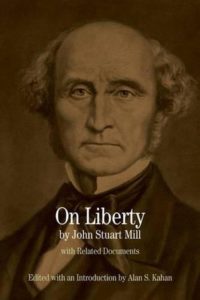 The predominant note in Mill’s writings is not utilitarianism. On Liberty is the clearest exposition of the views of those who desire a tolerant society for the different individual; for example, he who advocates race realism. Mill was the intellectual answer to Rousseau. What he came to value most was the spark of individual genius, the human anomaly; and in On Liberty, which he began writing in 1855, he loved the independent thinker, the solitary worker; the dissident, the eternal questioner of established values, the one who questions the dogmas of the masses and their prejudices; in a word, the outsider who today is personified in he who doesn’t subscribe to the dogma of egalitarianism of race, gender and sexual orientation.
The predominant note in Mill’s writings is not utilitarianism. On Liberty is the clearest exposition of the views of those who desire a tolerant society for the different individual; for example, he who advocates race realism. Mill was the intellectual answer to Rousseau. What he came to value most was the spark of individual genius, the human anomaly; and in On Liberty, which he began writing in 1855, he loved the independent thinker, the solitary worker; the dissident, the eternal questioner of established values, the one who questions the dogmas of the masses and their prejudices; in a word, the outsider who today is personified in he who doesn’t subscribe to the dogma of egalitarianism of race, gender and sexual orientation.
I would like to end this comment with the words I addressed to Gaedhal on Monday: ‘One of the things that white nationalists have never understood is that Europe should already be under one German Reich. Neither the Europeans nor the Americans nor the Australians are capable of governing themselves without a good Führer, as seen with this triumph of democracy and Judeo-liberal values after WW2. Savitri taught me to see an inverted world like the inverted pyramids, which I even illustrated in her book with triangles on pages 172 and 177’.
